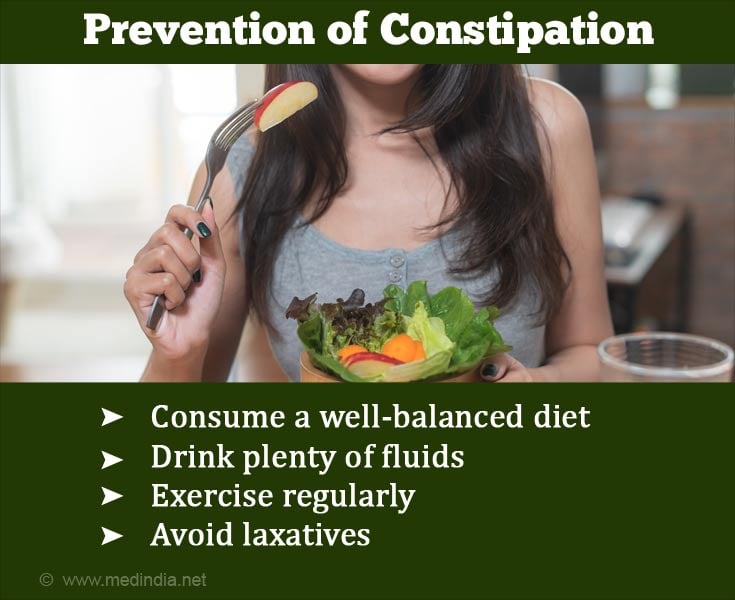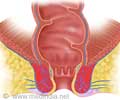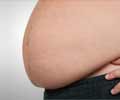About
Constipation refers to the infrequent or difficult passing of stool. It is the most common digestive complaint yet, is treated as a symptom, and not a disease by itself.
Constipation may be interpreted differently by different people. Some refer to it as infrequent bowel movement while for others it is difficulty in passing stool. Some people feel constipated if their bowel movement is incomplete. In some cases, constipation may accompany diarrhea, as in the case of the irritable bowel syndrome. It is therefore essential that constipation be viewed from these different perspectives and treated accordingly.
The frequency of bowel movement, among healthy people, varies greatly ranging from three movements a day to three times a week. If more than three days pass without bowel movement the condition gains clinical significance. During such time, the intestinal contents may harden, and a person may experience difficulty or even pain during defecation.
Constipation occurs among all ages, from newborns to elderly persons. However, this condition is more common among the elderly. Women experience this problem more than men.
The most common cause for constipation is a diet poor in fiber and low in fluid intake. There may be other causes as well such as pregnancy, medications, lack of exercises, emotional stress or even diseases. Colonic inertia and pelvic floor dysfunction can also cause constipation. Even habit has a role to play as ignoring the urge to pass stool can also result in constipation.
The affected individual may have the urge to pass stool but is unable to do so. This may result in discomfort and a bloated feeling in the stomach, stomach pain or cramps, headache, lethargy and vomiting. If constipation accompanies loss of appetite, vomiting, cramps, rectal bleeding or weight loss it requires immediate medical attention. Chronic constipation, which is long-lasting, does not require immediate medical attention and can often be relieved with the help of simple remedies.
Diagnosis of constipation is fairly simple. A medical history and a physical examination may be mandatory. This may be followed by laboratory tests such as blood, urine or stool tests and thyroid function test. A colonoscopy, or a barium meal enema X-ray may also be required. All these tests can help to detect underlying causes, if any, behind the condition.
Treatment of constipation depends on the underlying problem. Various kinds of laxatives are available to treat the condition. But they must be used only as the last resort. In some cases enemas, suppositories or surgery may be required. If pelvic floor dysfunction is the cause of constipation, a biofeedback training for the patient is the ideal choice of treatment.
Managing constipation also includes lifestyle changes. A balanced diet with loads of fiber, fruits and vegetables along with the regular intake of 8 glasses of water a day and moderate exercises can do wonders to manage the condition.
Causes of Constipation
Like fever, constipation can be caused by many different conditions -
- Diet: The most common cause of constipation is poor diet pattern with low fiber content. People who eat plenty of high-fiber foods are less likely to become constipated.
- Inadequate fluid intake: Liquids like water and juice add fluid to the colon and bulk to stools, making bowel movements softer and easier to pass. People who have the problem of constipation should drink 8 glasses of water daily.
- Medicines: Pain medications, antacids that contain aluminum, antispasmodics, antidepressants, iron tablets, cough medicines which contain codeine, diuretics, and anticonvulsants for epilepsy can slow passage of bowel movements. Lack of physical work can lead to constipation.
- Irritable Bowel Syndrome (IBS): Is one of the most common causes of constipation. Some people develop spasms of the colon that delay the speed with which the contents of the intestine move through the digestive tract, leading to constipation.
- Laxative: People who habitually take laxatives become dependent upon them and may require increasing dosages until, finally, the intestine becomes insensitive and fails to work properly.
- Travel: People often experience constipation when traveling long distances, which may relate to changes in lifestyle, schedule, diet, and drinking water.
- Hormonal Disturbances: Certain hormonal disturbances, such as an underactive thyroid gland, can produce constipation.
- Pregnancy: Pregnancy is another common cause of constipation. The reason may be partly mechanical, in that the pressure of the heavy womb compresses the intestine, and may be partly due to hormonal changes during pregnancy.
- Specific Diseases: Many diseases that affect the body tissues, such as scleroderma or lupus, and certain neurological or muscular diseases, such as multiple sclerosis, Parkinson's disease, and stroke, can be responsible for constipation.
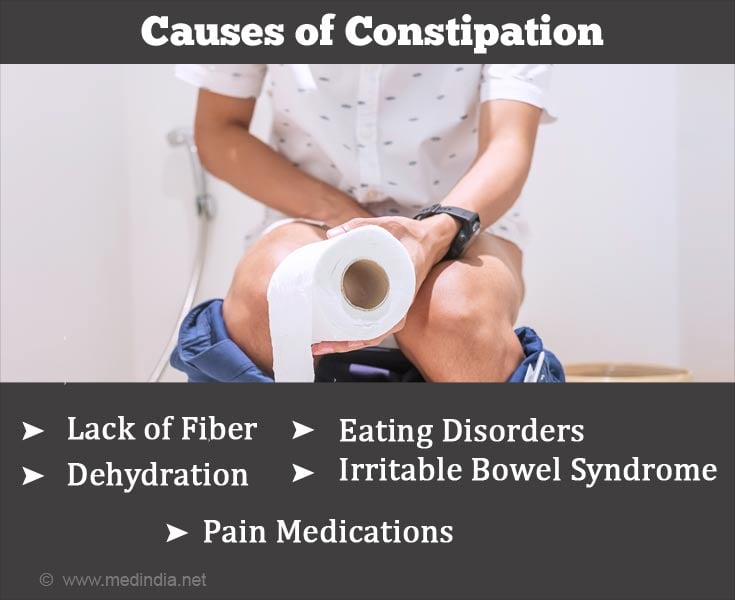
What are the Symptoms of Constipation?
- There maybe bleeding at the rectum.
- Women may find intercourse uncomfortable if the bowel is very full.
- Patients may feel uncomfortable or distended (bloated) in the abdomen, or feel a sense of fullness at the lower back.
How can we Diagnose Constipation?
- Medical history- A general medical history is taken including duration of symptoms, frequency of bowel movements, consistency of stools, presence of blood in the stool, and toilet habits (how often and where one has bowel movements).
Recording eating habits, medication, and level of physical activity or exercise also helps the doctor determine the cause of constipation.
- In addition to routine blood, urine, and stool tests, a sigmoidoscopy may help detect problems in the rectum and lower colon.
- Thyroid function tests maybe taken to check for thyroid disorders.
- A barium enema x-ray involves viewing the rectum, colon, and lower part of the small intestine to locate any problems.
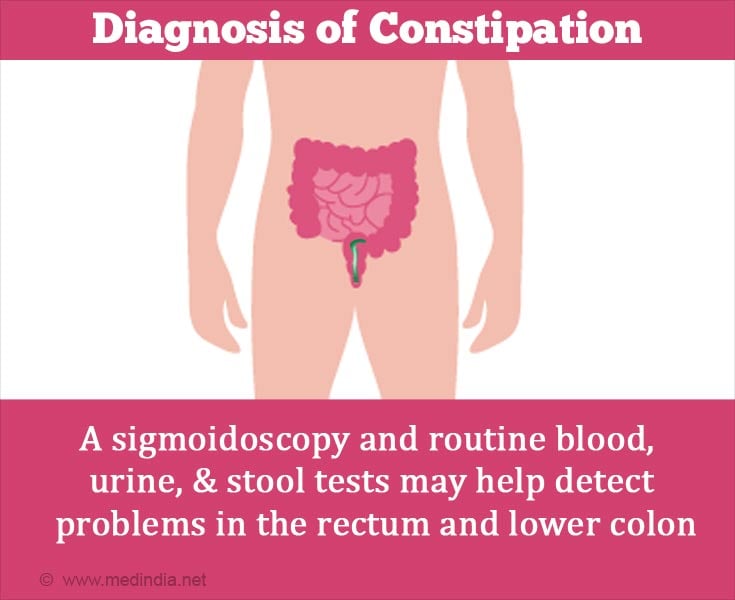
How can Constipation be Treated?
- A well-balanced diet that includes fiber-rich foods, such as unprocessed bran, whole-grain bread, and fresh fruits and vegetables, is recommended.
Drinking plenty of fluids and exercising regularly will help to stimulate intestinal activity. Special exercises may be necessary to tone up abdominal muscles after pregnancy or whenever abdominal muscles are lax.
- Stool softners and laxatives may be recommended to add fluid and bulk to the stool and aid in the passage of stools.
- If constipation is associated with emotional problems, counseling or similar treatment may help.
More Valuable Information About Constipation
At times constipation may lead to complications.
These complications include hemorrhoids caused by straining to have a bowel movement or anal fissures (tears in the skin around the anus) caused when hard stool stretches the sphincter muscle. Following this, rectal bleeding may occur. Treatment for hemorrhoids may include warm tub baths, ice packs, and application of a cream to the affected area.
Eating foods high in fiber, including bran, shredded wheat, whole grain breads and certain fruits and vegetables will help provide the 25 to 30 grams of fiber per day recommended for proper bowel function.
Prevention:
- Eat a well-balanced diet that includes unprocessed bran, whole-wheat grains, fresh fruits and vegetables.
- Drink plenty of fluids.
- Exercise regularly.
- Set aside time after breakfast or dinner for undisturbed visits to the toilet.
- Don't ignore the urge to defecate.
- Don't take laxatives too often.
- Whenever there is a significant or prolonged change in bowel habits, check with a doctor.
